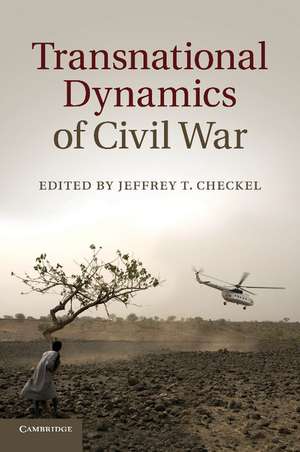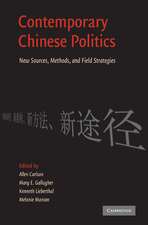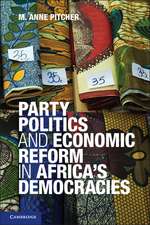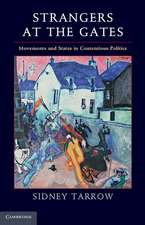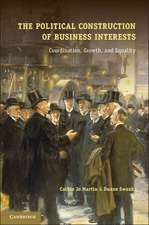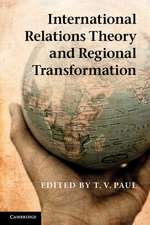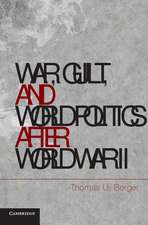Transnational Dynamics of Civil War
Editat de Jeffrey T. Checkelen Limba Engleză Paperback – 19 mar 2014
| Toate formatele și edițiile | Preț | Express |
|---|---|---|
| Paperback (1) | 287.07 lei 6-8 săpt. | |
| Cambridge University Press – 19 mar 2014 | 287.07 lei 6-8 săpt. | |
| Hardback (1) | 722.65 lei 6-8 săpt. | |
| Cambridge University Press – 23 ian 2013 | 722.65 lei 6-8 săpt. |
Preț: 287.07 lei
Nou
Puncte Express: 431
Preț estimativ în valută:
54.93€ • 57.50$ • 45.72£
54.93€ • 57.50$ • 45.72£
Carte tipărită la comandă
Livrare economică 31 martie-14 aprilie
Preluare comenzi: 021 569.72.76
Specificații
ISBN-13: 9781107643253
ISBN-10: 1107643252
Pagini: 324
Ilustrații: 3 b/w illus. 8 tables
Dimensiuni: 152 x 229 x 17 mm
Greutate: 0.44 kg
Editura: Cambridge University Press
Colecția Cambridge University Press
Locul publicării:New York, United States
ISBN-10: 1107643252
Pagini: 324
Ilustrații: 3 b/w illus. 8 tables
Dimensiuni: 152 x 229 x 17 mm
Greutate: 0.44 kg
Editura: Cambridge University Press
Colecția Cambridge University Press
Locul publicării:New York, United States
Cuprins
Part I. Civil War: Mobilizing across Borders: 1. Transnational dynamics of civil war Jeffrey T. Checkel; Part II. Transnationalized Civil War: 2. Copying and learning from outsiders? Assessing diffusion from transnational insurgents in the Chechen wars Kristin M. Bakke; 3. Mechanisms of diaspora mobilization and the transnationalization of civil war Fiona B. Adamson; 4. Refugee militancy in exile and upon return in Afghanistan and Rwanda Kristian Berg Harpviken and Sarah Kenyon Lischer; 5. Rebels without a cause? Transnational diffusion and the Lord's Resistance Army, 1986–2011 Hans Peter Schmitz; 6. Transnational advocacy networks, rebel groups, and demobilization of child soldiers in Sudan Stephan Hamberg; 7. Conflict diffusion via social identities: entrepreneurship and adaptation Martin Austvoll Nome and Nils B. Weidmann; Part III. Theory, Mechanisms, and the Study of Civil War: 8. Causal mechanisms and typological theories in the study of civil conflict Andrew Bennett; 9. Transnational dynamics of civil war: where do we go from here? Elisabeth Jean Wood.
Recenzii
'Jeff Checkel has assembled an excellent group of authors with on-the-ground expertise on civil wars and sensibility to standards of social-science method and research design. [This] book should enjoy a wide readership of scholars of civil war and students taking courses on international relations, transnationalism, and civil conflict.' Matthew Evangelista, Cornell University
'Featuring the workings of various causal mechanisms, this volume contributes invaluably to our understanding of dynamic processes at work during civil war.' Scott Gates, Director, Centre for the Study of Civil War, Peace Research Institute Oslo (PRIO)
'With more than half of all post-1945 civil wars spilling across state borders, this new volume offers a welcome introduction into the often overlooked transnational dynamics of 'local' wars. Taken as a whole, these chapters also provide compelling evidence for the importance of qualitative process-tracing that moves beyond just-so stories to the much tougher challenge of rigorously testing the mechanisms that underpin our explanations of civil war dynamics.' Jason Lyall, Yale University
'Featuring the workings of various causal mechanisms, this volume contributes invaluably to our understanding of dynamic processes at work during civil war.' Scott Gates, Director, Centre for the Study of Civil War, Peace Research Institute Oslo (PRIO)
'With more than half of all post-1945 civil wars spilling across state borders, this new volume offers a welcome introduction into the often overlooked transnational dynamics of 'local' wars. Taken as a whole, these chapters also provide compelling evidence for the importance of qualitative process-tracing that moves beyond just-so stories to the much tougher challenge of rigorously testing the mechanisms that underpin our explanations of civil war dynamics.' Jason Lyall, Yale University
Descriere
Combining innovative theory with detailed case studies, this book offers a novel account of the border-crossing processes of civil war.
